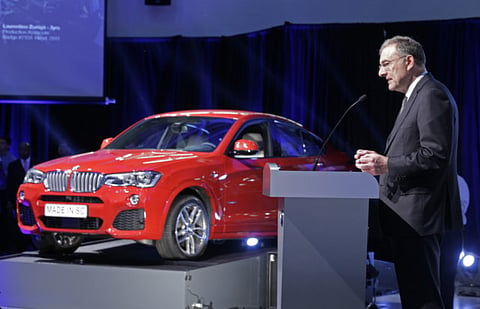BMW plans $1b expansion in South Carolina
Greer plant to make 450,000 vehicles a year by 2016, becoming the largest of the company’s 28 plants around the world

Greer, South Carolina: BMW is celebrating its 20th anniversary of building cars in the United States by investing $1 billion (Dh3.67 billion) in its plant in South Carolina to build two of its new X-series vehicles at the facility that ushered in a wave of foreign automakers building Southern plants.
The German automaker announced Friday it will produce the X7, a larger SUV with three rows of seats similar to a Cadillac Escalade. The company will also make the X4, a sportier version of the X3 coupe and plans to build a plug-in hybrid version of its smaller X5 SUV.
The $1 billion will be spent through 2016 at the plant in Greer, a town in the foothills of the Blue Ridge Mountains. BMW said it will hire 800 additional workers, bringing total employment at the plant to 8,800 people. The Greer plant will make 450,000 vehicles a year by 2016, becoming the largest of the company’s 28 plants around the world.
“We love Germany. But South Carolina is now the BMW capital of the world,” South Carolina Governor Nikki Haley said at a glitzy ceremony to both celebrate the expansion and honour what the German automaker has meant to the state.
Almost 300,000 BMWs were made in South Carolina last year, and more than 2.6 million vehicles have rolled off the plant’s assembly lines in the past two decades.
BMW first started making cars in South Carolina in 1994 after months of courtship from around the country. The plant has become as much of a part of the state’s modern cultural landscape as the Shag and barbecue. The company said access to interstates highways, rail lines and the Atlantic Ocean were the state’s biggest draws. About 70 per cent of the vehicles made at the Greer plant are exported, most on ships out of the port in Charleston.
Workforce
South Carolina was dealing with the slow death of the American textile industry and had almost no automotive industry to speak of outside Michelin tyre plants when BMW arrived. Now there are automotive part makers and suppliers in 38 of the state’s 46 counties. A University of South Carolina study found BMW and its suppliers are directly responsible for more than 30,000 jobs in the state, or more than 1 per cent of South Carolina’s total workforce.
BMW planned to make 50,000 vehicles a year on the day in June 1992 when then Gov. Carroll Campbell drove away from the announcement of the German automaker’s first foreign plant in a sedan with a South Carolina “BMW 1” licence plate. BMW officials said the success that has led production to increase ninefold was beyond the wildest dreams of the team that planned the Greer factory.
“There is no doubt. Our decision to come to South Carolina was the right one,” BMW CEO Norbert Reithofer said.
To Reithofer’s left on Friday was the white BMW 318i that rolled off the assembly line in Greer in September 1994 to become the first BMW made outside Germany. To his right, a BMW employee drove up a new X4 on a platform in a shower of fog and lights. And just beyond the glass wall behind him, workers never stopped putting molding and upholstery panels on the doors of vehicles as they came down the line.
Pioneer
BMW officials said they only reached this milestone because their employees have been so talented. Reithofer, who managed the South Carolina plant for several years, called the region his home away from home.
“We have learned to appreciate America and its people. Twenty years after opening this plant, I am proud to say we at the BMW Group are proud to say we are a real part of America,” Reithofer said.
BMW was a pioneer for the automotive industry in the American South. Mercedes-Benz followed with a plant in Alabama a year later, and in the past two decades, Nissan, Toyota and Volkswagen have all followed with plants built in rural Southern locations not far from decent-sized cities.
The foreign automakers also benefited from cheaper, non-unionised labour. Earlier this year, workers at the Volkswagen plant near Chattanooga, Tennessee, refused a vote to organise, even with management’s blessing.
Sign up for the Daily Briefing
Get the latest news and updates straight to your inbox


